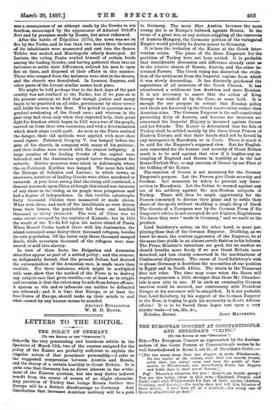LETTERS TO THE EDITOR.
THE POLICY OF GERMANY.
[To THE &smolt or THE "SPNCTLT011."] Sin, In the very penetrating and luminous article in the Spectator of March 13th, two of the reasons assigned for the policy of the Kaiser are probably sufficient to explain the singular action of that prominent personality.—I refer to the suggested compromise between Austria and Russia, and the theory of a certain hostility to Great Britain. It is quite true that Germany has no direct interest in the settle- ment of the Eastern question, but she may derive indirect benefit from the course of events of no slight character. Any partition of Turkey that brings Russia further into Europe will be a distinct disadvantage to Germany. Any distribution that increases Austrian territory will be a gain to Germany. The more Slav Austria becomes the more strong she is as Europe's bulwark against Russia. In the event of a great war, or any serious crippling of the resources of Austria-Hungary, the Germanic portion of the variegated Empire would probably be drawn nearer to Germany.
It is here the irritation of the Kaiser at the Greek inters vention arises. The plans of the three Emperors for the partition of Turkey have not been settled. It is probable that considerable discussion and difference already exist as to the relative shares of Russia, Austria, and the other in- terested Powers. The Greek rising has disturbed the evolu- tion of the settlement from the Imperial regions from which it was slowly descending. It has distinctly quickened the aspirations of all members of the Greek Church. It has adumbrated a settlement less Austrian and more Russian. It is not necessary to assert that the action of King George was winked at by the Czar, as some hold. It is enough for our purpose to submit that Russian policy and ideals are favoured by the Greek intervention rather than Austrian aims. The German Emperor is the self-constituted protecting deity of Austria, and because her interests are concerned his Imperial Majesty is incensed against Greece and her friends. The Kaiser is determined that the fate of Turkey shall be settled mainly by the three Great Powers of Eastern Europe, and that their hands shall not be forced by any insurgents in Macedonia or in Crete. There is much tc be said for the Emperor's supposed view. But for English. men concerned for the honour and security of Great Britain much is to be said against that view if it implies any en. tangling of England and Russia in hostility as in the last Russo-Turkish War, or any coercion of Greece by our Fleet at the bidding of the Kaiser.
The coercion of Greece is not necessary for the German Emperor's purpose. Let the Powers give Crete security and freedom. Let measures be taken to prevent any insur- rection in Macedonia. Let the Sultan be warned against any use of his soldiery against the non•Moslem subjects of Turkey. There will then be ample opportunity for the Powers concerned to discuss their plans and to settle their share of the spoils without shedding a single drop of blood. The threats of a European war by the German Press if the Emperor's advice is not accepted do not frighten Englishmen. We know they were " made in Germany," and we smile at the product.
Lord Salisbury's action, on the other hand, is more per- plexing than that of the German Emperor. Disliking, as we know he must, the restless aggression of the Emperor, he at the same time yields in an almost servile fashion to his behests. The Prime Minister's intentions are good, but we confess we should breathe more freely if we saw Great Britain more detached, and less closely concerned in the machinations of Continental diplomacy. The cause of Lord Salisbury's wish to please Germany is doubtless the necessities of our position in Egypt and in South Africa. The strain in the Transvaal does not relax. The time may come when the Boers will require arguments a little stronger than those Mr. Chamber- lain is now able to use. If in such an eventuality German inaction could be secured, our controversy with President Kruger or his successor will be simplified. Is it not probable that Lord Salisbury, by his support of the German Emperor in the East, is hoping to gain his neutrality in South African affairs ? It is to be feared these hopes rest upon a very slender basis.—I am, Sir, &c.,






































 Previous page
Previous page